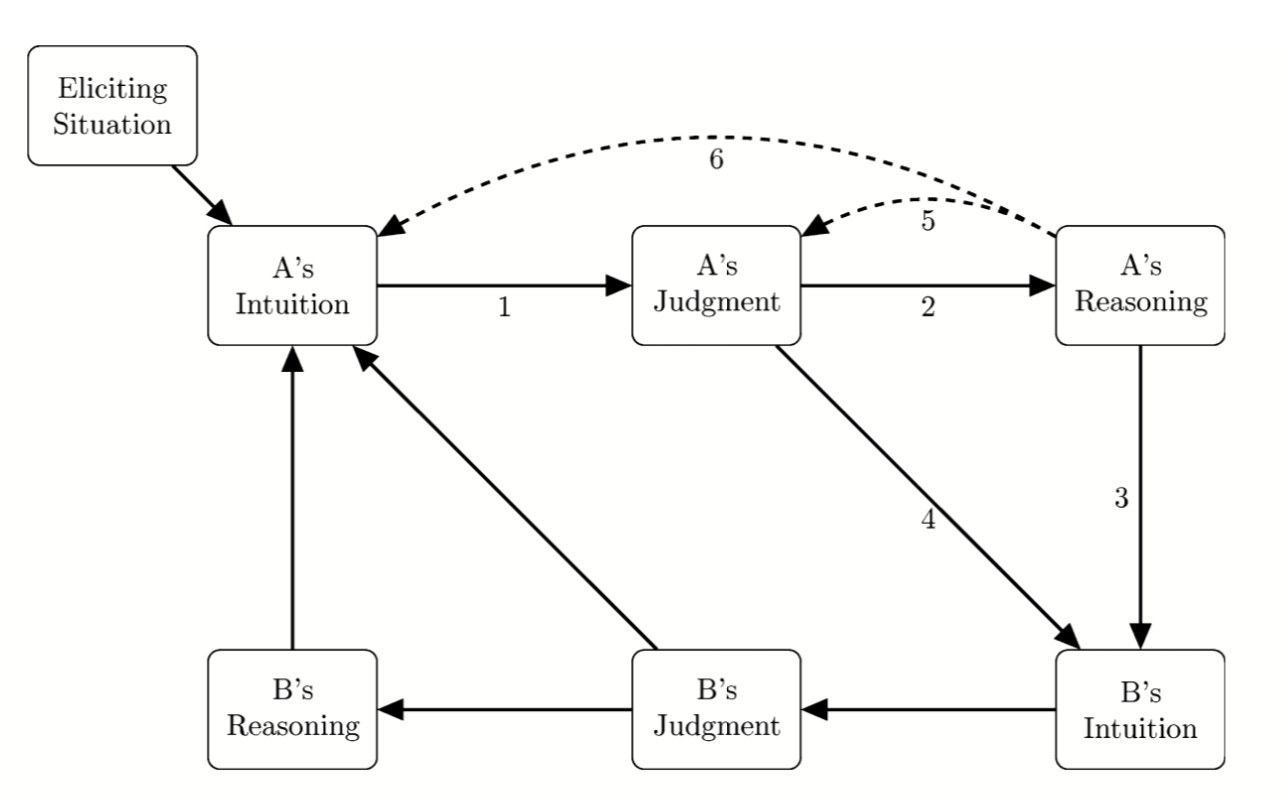Moral Foundations Theory: An Approach to Cultural Variation
Moral Foundations Theory is ‘a systematic theory of morality, explaining its origins, development, and cultural variations’ (Graham et al., 2011, p. 368). It comprises four assertions about the cultural origins of ethical abilities.
By the end of this section you should understand, at least roughly, what Moral Foundations Theory claims.
If the video isn’t working you could also watch it on youtube. Or you can view just the slides (no audio or video).
This recording is also available on stream (no ads; search enabled).
If the slides are not working, or you prefer them full screen, please try this link. The recording is available on stream and youtube.
Notes
Why This Theory?
Moral Foundations Theory is the most difficult theory to understand that we will encounter.
As we will see later, there is at best weak evidence for key applications of Moral Foundations Theory (Davis et al., 2016; Doğruyol, Alper, & Yilmaz, 2019; Kivikangas, Fernández-Castilla, Järvelä, Ravaja, & Lönnqvist, 2021). It also faces significant theoretical objections (we have already seen one objection in Moral Disengagement: Significance). Its proponents appear to ignore the strongest objections to Moral Foundations Theory and fail to cite research reporting evidence against the theory (e.g. Graham et al., 2019).
So why consider Moral Foundations Theory at all? Some of its strongest opponents make the best case for studying it:
‘It would be difficult to overestimate the influence of this theory on psychological science because it caused a dramatic broadening in conceptualization of morality beyond narrow Western notions that have focused on individualistic virtues associated with protecting one’s rights—especially prevention of harm (Gilligan, 1982) and unjust treatment (Kohlberg, 1969).
‘The expansion of morality psychology to more collectivistic domains has led to substantial research into the role of morality in the political environment. More specifically, there is significant support for the moral foundations hypothesis that predicts that conservatives tend to draw on virtues associated with binding communities more than liberals (Graham, Haidt, & Nosek, 2009; Graham et al., 2011; Koleva, Graham, Iyer, Ditto, & Haidt, 2012)’ (Davis, Dooley, Hook, Choe, & McElroy, 2017, p. 128).
And although it is usually categorised as psychology, it is also fruitfully considered as philosophy (and perhaps as anthropology). It’s hard not to love it.
What the Theory Claims
Moral Foundations Theory is the conjunction of four claims.1
The first is a form of nativism:
‘the human mind is organized in advance of experience so that it is prepared to learn values, norms, and behaviors related to a diverse set of recurrent adaptive social problems’ (Graham et al., 2013, p. 63).
Second, moral psychology is affected by cultural learning (‘The first draft of the moral mind gets edited during development within a culture.’)
Third, the Social Intuitionist Model of Moral Judgement is true. This is a set of hard-to-understand claims in itself (which we already considered briefly in Moral Disengagement: Significance). Two of these are:
‘moral evaluations generally occur rapidly and automatically, products of relatively effortless, associative, heuristic processing that psychologists now refer to as System 1 thinking’ (Graham et al., 2013, p. 66)
and:
‘moral reasoning is done primarily for socially strategic purposes’ (Graham et al., 2013, p. 66)
The Social Intuitionist Model is depicted in this figure:
 Figure: The Social Intuitionist Model of Moral Judgement. Arrows are interpreted causally. Dotted lines represent connections of low significance. Source: Haidt & Bjorklund (2008, p. figure 4.1)
Figure: The Social Intuitionist Model of Moral Judgement. Arrows are interpreted causally. Dotted lines represent connections of low significance. Source: Haidt & Bjorklund (2008, p. figure 4.1)
Fourth, moral pluralism is true. (‘There are many psychological foundations of morality’ (Graham et al., 2019, p. 212).) This was the topic of Moral Pluralism: Beyond Harm. Haidt & Joseph (2004) and Haidt & Graham (2007) claim that there are five evolutionarily ancient, psychologically basic abilities linked to:
- harm/care
- fairness (including reciprocity)
- in-group loyalty
- respect for authorty
- purity, sanctity
It is not important to the theory that these be the only foundations, nor that these be exactly the foundations (perhaps one is wrong, and should be replaced by two different ideas).2
Glossary
References
-
Graham et al. (2019) is probably the most accessible introduction, and this is the main source I follow in the lectures. Although a book chapter, it is available online. Haidt (2007) is useful if you are short of time. The theory first appears in Haidt & Graham (2007). ↩
-
To illustrate, Moral Foundations Theory has had some difficulties with Libertarians …
‘Libertarians have a unique moral-psychological profile, endorsing the principle of liberty as an end and devaluing many of the moral concerns typically endorsed by liberals or conservatives’ (Iyer, Koleva, Graham, Ditto, & Haidt, 2012, p. 21).
Since ‘MFT’s five moral foundations appeared to be inadequate in capturing libertarians’ moral concerns, [we decided to] to consider Liberty/oppression as a candidate for addition to our list of foundations’ (Graham et al., 2013, p. 87). ↩